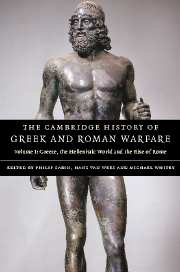Book contents
- Frontmatter
- Introduction: The Historiography of Ancient Warfare
- Part I Archaic and Classical Greece
- Part II The Hellenistic World and the Roman Republic
- 10 International relations
- 11 Military forces
- 12 War
- 13 Battle
- 14 Warfare and the state
- 15 War and society
- Chronological Table
- Glossary
- List of Ancient Authors
- Bibliography
- Index of ancient passages cited
- General index
- Map 1 The western Mediterranean
- Map 3 The Near East
- References
14 - Warfare and the state
from Part II - The Hellenistic World and the Roman Republic
Published online by Cambridge University Press: 28 March 2008
- Frontmatter
- Introduction: The Historiography of Ancient Warfare
- Part I Archaic and Classical Greece
- Part II The Hellenistic World and the Roman Republic
- 10 International relations
- 11 Military forces
- 12 War
- 13 Battle
- 14 Warfare and the state
- 15 War and society
- Chronological Table
- Glossary
- List of Ancient Authors
- Bibliography
- Index of ancient passages cited
- General index
- Map 1 The western Mediterranean
- Map 3 The Near East
- References
Summary
the hellenistic world
The defining element of the Hellenistic world is most certainly warfare. The age was characterized by almost endless military struggles, with up to five major powers battling each other over the remnants of Alexander’s empire. Warfare in the Hellenistic world was so ubiquitous that general narratives of the period often skip over entire military campaigns, due to their tangled politics and lack of enduring impact. Although there are some excellent modern studies of Hellenistic warfare, some areas remain largely elusive and have traditionally been given short shrift. Imperialism, finance and in particular the links between the two, are subjects that, while of tremendous importance to Hellenistic warfare, have rarely been studied in depth. This section, while too brief to redress the balance, none the less aims to be a starting point for further study.
Modern scholars often forget about the tribal roots of the Macedonians, and that their society in the fourth and third centuries was still one of warrior élites. Macedonian generals of the Hellenistic world still fought from the front as their predecessors had, and kings were traditionally seen as the first among equals. Although modern scholarship tends to assign credit for the conquest of the East exclusively to Alexander, the sources suggest that the Diadochoi viewed it as a more broadly Macedonian achievement. This goes part of the way towards explaining the ubiquity of warfare in the Hellenistic period; warfare was what the Successors did, they were both generals and warriors, and in theory they, like all Macedonian kings, should have had the ability to plan and undertake a massive campaign, and at the same time to fight the enemy in the thick of combat.
- Type
- Chapter
- Information
- The Cambridge History of Greek and Roman Warfare , pp. 461 - 497Publisher: Cambridge University PressPrint publication year: 2007
References
- 4
- Cited by

